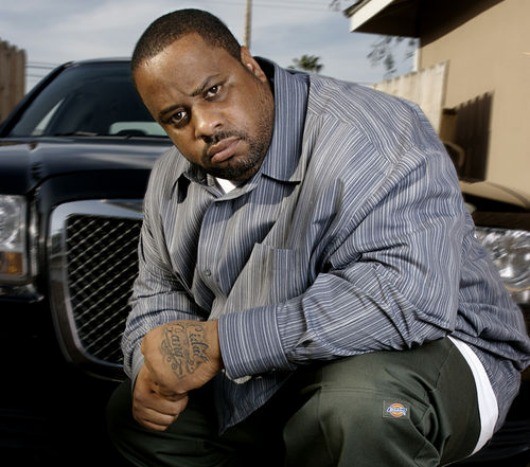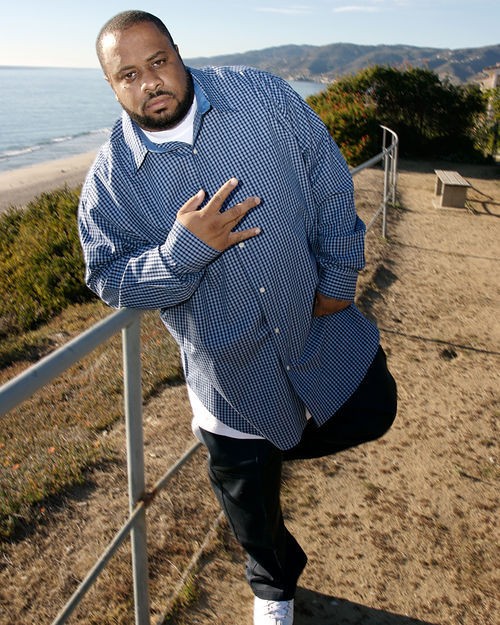
On Dec. 31, 1991, Darnell Price put a loaded 22-caliber pistol to his head and pulled the trigger. It's a story he has told countless times. Most can't believe he's actually still around to tell it. As he runs his plump index finger over the faint crescent-shaped scar bordering his right temple, it still doesn't seem real. Especially when he mentions that the bullet is still lodged in his skull, millimeters from his brain. At the time, doctors told Price there was no safe way to extract it, so there it stays. In the middle of his graphic tale, somehow the memory of a world of pain and depression that almost killed him is transformed into a well-timed quip.
“Shell gas station ain't the only ones who got shells,” he says, flashing a jovial, gap-toothed grin.
Twenty-two years after nearly killing himself, the rapper/entrepreneur called OG Cuicide has plenty to live for. His husky 5-foot-11 frame sinks into a plush, black swivel chair behind a stately oak desk. He sports a gray, pinstriped dress shirt as he casually rolls a blunt on the desk just after 5:30 p.m. He's in the back warehouse of a local Santa Ana weed dispensary, where he works as a bodyguard six days a week. That's on top of managing his rap career; running his independent, internationally distributed urban-culture magazine One West; and being a husband and father of four. But his most important side hustle is perhaps as ironic as it is inspiring–he now lectures students on the proper techniques of suicide prevention.
]
For the past three years, he has talked about his life story at elementary schools, middle schools, after-school programs and high schools; he has been invited by everyone from the mayor of his hometown, Compton, to teachers in the San Diego suburbs to preach his knowledge on suicide statistics and how to help someone before they decide to check out early. “I show people that they can pull through,” says the bearded, 44-year-old Cuicide. “There's a lot of people, poor and rich, killing themselves. So for people who come to that point in life, I understand them because I've been them.”
A respected rapper, Cuicide has pushed his product as an artist and entrepreneur since 1995. After moving to Buena Park with his wife in 2001, he continued the grind in OC, where, in addition to public speaking, he started One West earlier this year. Named after Cuicide's independent, custom clothing line and one of his singles, the glossy mag recently garnered distribution in the U.S., France, Australia, Japan and London. “[The magazine] has more of a positive vibe about rappers and rap music,” he says. “There's nothing in there about rappers beefing with other rappers. But you can learn more about their lives.”
Cuicide probably one-ups most of the rappers in his magazine when it comes to a crazy life story. Abandoned by his mother in an apartment at 18 months old, he and his brother were quickly placed into two separate foster homes. Despite being well taken care of by his foster mother, at age 16, he was already slipping into the role of a neighborhood gangbanger. He sold dope and got into shoot-outs with rival gangs. His foster mother eventually kicked him out of the house, so he lived on the streets, sleeping in cars, getting booted off friends' couches and hustling to survive.
By age 22, he'd had enough, but he didn't see much of a way out. “I guess there's that saying, 'Some people have a shoulder to cry on,'” he says. “I feel like I didn't have one. I started feeling like I wanted to die.”
One afternoon, while hanging out and ironing his pants at a friend's house, he decided to pull out his pistol and mash it against the side of his head as his friends watched, horrified.
[

“One of the homies was saying, 'Man, what'chu doing?!' And I was like, 'Man, I'm just tired; I can't do it no more. What? You don't think I'll do it?!'”
The next thing he heard was a loud pop as his face hit the floor. He was rushed to Martin Luther King Hospital, where he miraculously survived. Somehow, the bullet lodged in his skull but hadn't penetrated his brain. But even that lifesaving event wasn't enough to sway him from street life and the depression that dogged him after checking out of the hospital. That is until a local producer friend of his coaxed him into rapping over a handful of beats he'd made one day at his house.
Whether it was the promise of catharsis, or just the chance to finally be good at something, Cuicide pursued hip-hop with a passion. He compiled enough good songs about his life struggle to solicit legendary, LA-based soul singer/producer Leon Haywood (best known for the 1975 hit “I Want'a Do Something Freaky to You,” sampled by Dr. Dre, 50 Cent and others). He helped Cuicide put out his eponymous debut album in '95; it included the aptly titled lead single “Final Exit.”
Though his music never attained the level of notoriety achieved by Snoop Dogg, RBX or Kurupt–rappers he'd befriended as a young dope dealer–Cuicide says his gravelly tone and self-reflective spin on G-Funk resonated with his peers. “People were recognizing my music because I was speaking about what everyone was going through,” he says. “I'm not the only one who walked in this lifestyle.”
He has released a total of three albums–his last being 1999's Wonder Why, which focuses on the natural state of war faced by those who manage to survive in LA's poorest neighborhoods.
Though there were a handful of mixtapes in the early 2000s, the rapper says he's just now putting the finishing touches on his first album in 14 years, The Storyboard. With or without a ton of album credits, his rep as a streetwise mentor to local up-and-comers is intact. But talking to young people about his struggles with suicide hadn't become a calling until after he was nearly killed twice–in '07 and '08–during two separate drive-by shootings in Compton. The first one left another bullet lodged in his body–his back this time–after he was shot in the stomach with an AK-47 by unknown assailants.
[
After surviving three near-death experiences, Cuicide's desire to share his story led him to reach out; he was soon contacted by schoolteachers and youth-program coordinators. Videos of his lectures can be seen all over YouTube. His advocacy extends to just about every public-media outlet, including KDAY-FM 93.5; at the end of a recent segment with the station, he gave out his personal phone number (as he always does). [It's (310) 938-9376. He insisted we print it.] By the end of the day, he'd gotten three legitimate calls from people who had heard his message on the radio.
Cuicide says it's not uncommon for him to be contacted by strangers at all hours asking for real advice on how to deal with depression and suicidal thoughts. It's a service he's proud to offer, he says, one that reminds him that every distressed phone call is a chance to give someone the help he should've gotten all those years ago when he felt like no one would listen.
“Twenty-two years ago, I didn't even want to look at myself in the mirror,” Cuicide says. “But now when I look in the mirror, I'm looking at a person who's trying to create a way and make it better.”
See also:
10 Jazz Albums to Listen to Before You Die
25 Greatest Orange County Bands of All Time
@OCWeeklyMusic and like us on Facebook at Heard Mentality.

